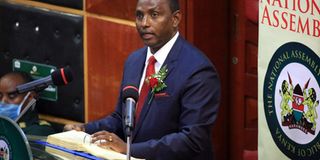Budgeting based on exaggerated figures recipe for economic woes

What you need to know:
With exaggerated revenue targets, you end up with an unsustainable budget deficit.
I had expected issues around the Covid-19 pandemic to dominate this year’s budget speech. For as we all know, budget-making is not just about taxing and spending. It is also about giving private actors in the economy a road map to the future.
Given the inherent uncertainty around the pandemic and the lack of clarity about the likely length of the economic lockdown, companies and economic actors badly want to know what the medium term is likely to look like. No business can credibly assess its own viability in the current environment.
SINKING COMPANIES
Yet I don’t see a sense of urgency to help companies that are literally sinking and dying in Cabinet Minister Ukur Yatani’s budget speech. Yes, the coronavirus stimulus package is one of the high-lights of the budget speech. But it is not near enough to make for the devastation wrought on businesses by the lockdown.
Neither did I see an attempt at giving a credible and honest assessment of the depth of the economic contraction we are about to experience in the coming year.
Instead, the biggest highlights in the budget were the huge lumpsum allocations to politically-correct projects. The minister announced how he had allocated Sh23 billion to pay for pending bills and VAT refunds, Sh34 billion for irrigation projects, Sh50 billion for universal health coverage programme, and Sh177 billion for security agencies Sh18 billion to SGR and Sh11 billion to the Konza technopolis project.
As I watched the minister announcing billions of allocations to projects, I found myself asking: Considering the poor revenue trends which have been seeing, and given the fact that the corona-virus-induced economic lockdowns are bound to put even more pressures on revenue collections this year — where will the money to fund the massive allocations in the budget speech come from?
It seems we still have major problems when it comes to the credibility of our budget numbers, especially projections of the size of the budget deficit. We start with exaggerated GDP growth numbers. Mark you, the calculation right now is that the economy will grow by 5.4 per cent this year. The International Monetary Fund has projected that it will grow by 0.8 per cent.
BUDGET DEFICIT
Once we exaggerate the GDP growth rate, the whole thing leads to exaggerated revenue targets. Mark you, Yatani’s budget was written on the presumption of a revenue target of Sh1.6 trillion. In addition, this was the same revenue target for last year which we could not achieve.
With exaggerated revenue targets, you end up with an unsustainable budget deficit. That leads you to designing spending plans and budgets you are incapable of funding.
This time round, Yatani has provided for a gaping Sh840 billion budget deficit in his spending plan. The domestic borrowing requirement is projected at Sh347 billion.
Can the government achieve these targets? There is a very small chance. First, expect MPs to tinker with the Finance Bill and to remove several tax measures and changes in the proposals.
Indeed, the deliberations on this year’s Finance Bill are expected to be explosive because Yatani has introduced unprecedented changes aimed at eliminating hundreds of tax exemptions and incentives from the tax code.
INTRODUCE CHANGES
Secondly, MPs have also become adept at lobbying to introduce changes to the Appropriations Bill. So, what should we expect in the medium term as the government starts grappling with crippling cash flow problems and as revenue shortfalls and the impact of the coronavirus lockdowns on the economy starts biting?
Expect to hear loud complaints about delays in exchequer releases especially by County government. Expect multiple supplementary bills that contain major re-allocations and cuts on the original budget. You can accuse me of being a pessimist but the truth of the matter is that the government is headed for difficult times as regards its finances.
Because of Covid-19, we must expect a sharp fall in revenues and exports. Even with the low oil prices, the current account will widen.
Then you have the risk of debt distress. Mark you, the IMF, in its latest debt sustainability analysis, has moved Kenya’s risk for debt distress from ‘moderate’ to ‘high’. Worse, access to international capital markets will remain constrained until the coronavirus goes away. It seems to me that we will have to depend more on the precarious benevolence of the multi-laterals.
We recently discovered that Kenya has about $10 billion of committed but undisbursed official development assistance on which we have been paying fees. The IMF recently gave us Sh78 billion. We have also received Sh108 billion from the World Bank, Sh22 billion from the African Development Bank and Sh75 billion from the European Union.
But as the saying goes, beware of Greeks bearing gifts.





